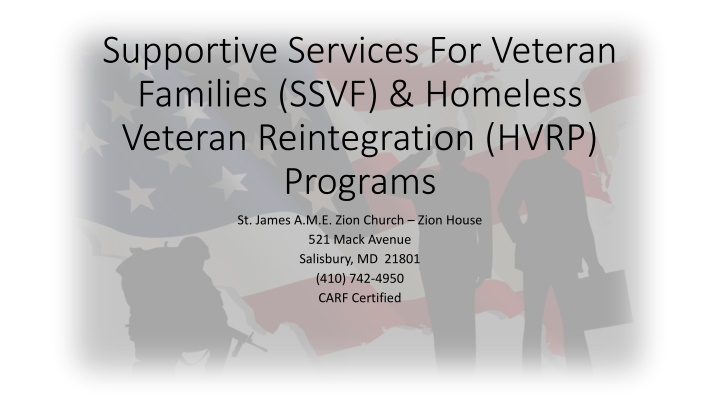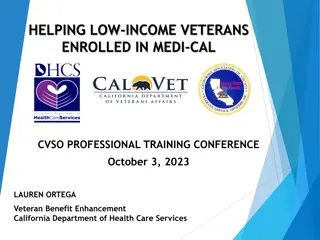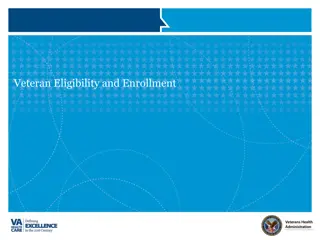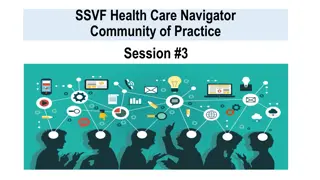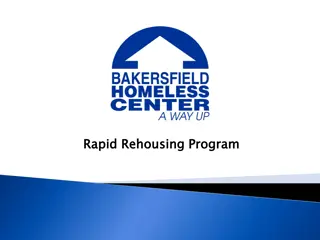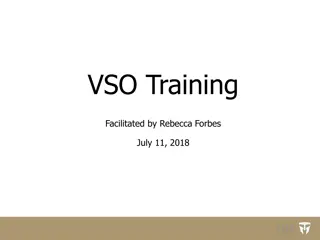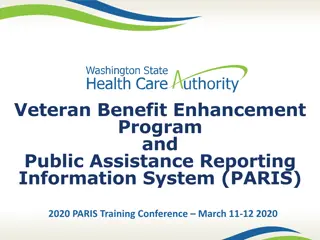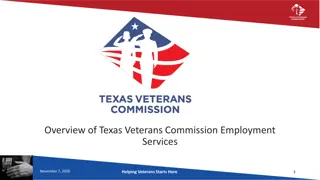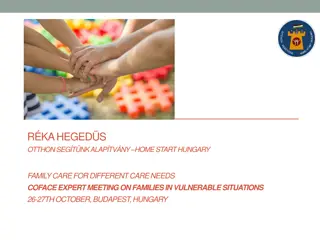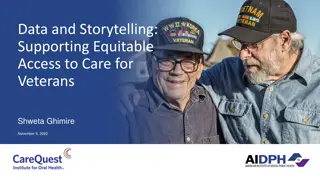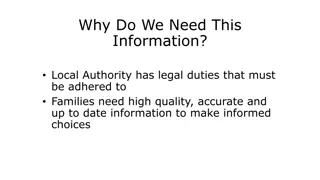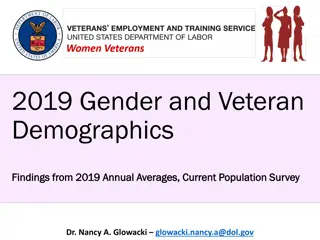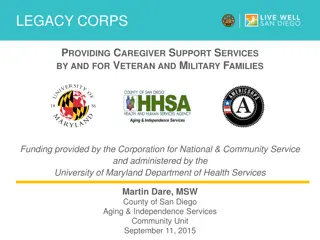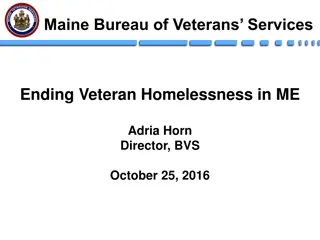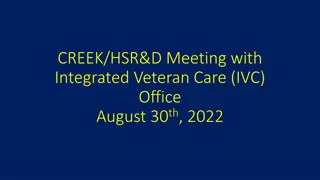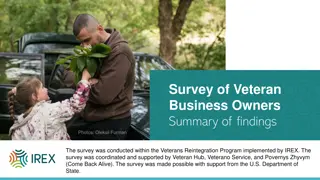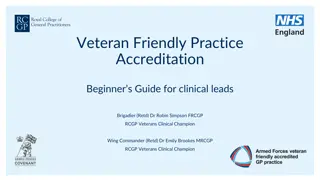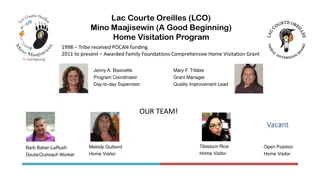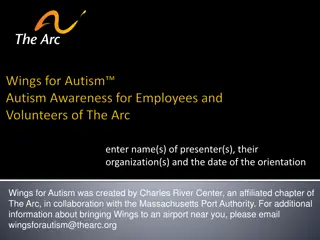Supportive Services for Veteran Families (SSVF) Program Overview
Supportive Services for Veteran Families (SSVF) program at St. James A.M.E. Zion Church provides housing-first services to prevent homelessness and rapidly re-house homeless veterans. With a focus on serving veterans and their families, the program offers financial assistance, access to benefits, and various supportive services to ensure family stability. Eligibility criteria include DD-214, income thresholds, and literal homelessness. The program serves 8 counties on the Eastern Shore of Maryland, offering outreach, case management, and connections to community resources for comprehensive support.
Download Presentation

Please find below an Image/Link to download the presentation.
The content on the website is provided AS IS for your information and personal use only. It may not be sold, licensed, or shared on other websites without obtaining consent from the author.If you encounter any issues during the download, it is possible that the publisher has removed the file from their server.
You are allowed to download the files provided on this website for personal or commercial use, subject to the condition that they are used lawfully. All files are the property of their respective owners.
The content on the website is provided AS IS for your information and personal use only. It may not be sold, licensed, or shared on other websites without obtaining consent from the author.
E N D
Presentation Transcript
Supportive Services For Veteran Families (SSVF) & Homeless Veteran Reintegration (HVRP) Programs St. James A.M.E. Zion Church Zion House 521 Mack Avenue Salisbury, MD 21801 (410) 742-4950 CARF Certified
What Is Supportive Services For Veterans Families (SSVF)? Supportive Services For Veterans Families (SSVF) is a housing first initiative to provide direct services to veterans and their families to prevent homelessness and to rapidly re-house homeless veterans. Since 2013 we have served 502 Veterans & their family members . Veterans are housed, then services are wrapped around them, based on need. SSVF provides financial assistance and links veterans to benefits to ensure family stability. Services provided include: oChildcare oTransportation Assistance oLegal Services oMoving Costs oRent/ Security & Utility Deposits/Payments oEmergency purchases/automotive repair
Areas Served St. James SSVF Program serves 8 of the 9 counties on the Eastern Shore of Maryland, including: oKent oQueen Anne oTalbot oCaroline oDorchester oWicomico oSomerset oWorcester
Eligibility Criteria oDD-214 Other than dishonorable oFor rapid re-housing, must be literally homeless in a location not meant for human habitation, shelter, hotel (paid by someone other than the veteran), in a vehicle, or on the streets. (Differs from HVRP where a veteran can be doubled up but in danger of losing their housing within 14 days) oVery low income, less than 50% of the area median income for the county in which service is being provided. oExtremely low income, 30% or less of area median income gets priority service.
Documents Needed For Intake/Assessment oPhoto Identification oSocial Security Card oDD-214 oProof of income/lack thereof oLandlord agreements/Lease oUtility bill(s) oRent receipt(s) oEviction Notice (financial assistance is but for this assistance, the Veteran would become homeless)
Service Model oMobile case managers that go where the Veterans are oStreet level outreach oConnection to a wide range of community partners that can address every aspect of a person s need: food, clothing, shelter, mental health, substance abuse, domestic violence, legal issues, etc. oActive landlord engagement oFollow-up (Wellness checks) oEngagement with employment counselors oProvide needed financial resources to include emergency purchases
Best Practices oCOLLABORATION COLLABORATION COLLABORATION oWe serve in a leadership roll on two Continuum of Care (COC) organizations oMid Shore covers five counties (Kent, Queen Anne, Talbot, Dorchester, and Caroline) oHomeless Alliance of the Lower covers three counties (Wicomico, Worcester, and Somerset) oI serve as co-chair of the joint Community Planning Committee taskforce to end Veteran Homelessness oStaff serve on various sub-committees including governance, chronically homeless, strategic planning, homeless prevention homeless youth, and monitoring and ranking. oPartnering with HUD/VASH Coordinator oPartnering with VA Homeless Case Manager oOur coordinated assessment model is a no wrong door approach, where homeless individuals can enter through any agency and be referred for appropriate assistance. oAll case managers are SOAR Certified to assist Veterans in getting SSI/SSDI benefits
Challenges oLack of affordable housing. The Eastern Shore of Maryland is referred to as the land of pleasant living . The six upper shore counties, above Dorchester has precious little affordable housing, if any. oWe are in close proximity to Ocean City and during peak season, hotels as far away as Dorchester county may not be available for emergency housing oShelter space is very limited oLandlords have tightened requirements and charge market rate rents, for the most part. They now require an individual has triple the rent as income. oSustaining Veterans in housing, once they are placed oJobs that pay a living wage (there is a lot of retail, restaurant and service industry on the Eastern Shore, we have lost a lot of manufacturing jobs)
Additional Program to Meet the Challenges Homeless Veterans Re-integration Program (HVRP) oThis is where we believed HVRP could be of assistance. oWe needed case managers who could concentrate specifically on employment assistance for Veterans and walk them through the application to placement and retention steps oWe needed assistance with transportation to job interviews and development of long-term transportation solutions with employers oWe needed additional resources for appropriate clothing, tools, training costs, etc. oWithout adequate employment, housing sustainability is impossible oWe now have these resources with the addition of the HVRP program
HVRP & SSVF System Integration The answer to housing sustainability is income. Sources of income for Veterans: VA Benefits SSI/SSDI (Disability) Employment The most sustainable income is from employment. It is essential that Veterans be placed in positions that pay a living wage.
HVRP & SSVF System Integration The service area for HVRP overlays the SSVF service area for our program. This was purposeful when determining the need for sustainability. The homeless Veterans that qualify for SSVF also qualifies for HVRP. The two programs are a natural progression of each other. Veterans are referred between both programs on a consistent basis. As the service area for HVRP is larger than for SSVF (11 counties as compared to 8 counties) we are able to refer Veterans to other SSVF providers in counties that our program does not cover. This builds relationships across boundaries and provides more comprehensive services to the Veterans.
HVRP & SSVF System Integration Serving the Veterans in both programs keeps the Veterans positively engaged in improving their situation. They have two case managers working with them at all times. This encourages the Veterans to focus on their needs and making an effort to self resolve where possible. Due to the monitoring requirements for HVRP, the Veterans are aware that their progress will be followed for a period of time. They are also aware that the case managers are available to them as needed. Integrating the programs also increases the housing retention rate.
Conclusion - At St. James Zion House we believe in holistic service provision. Although we use the housing first model, we ensure that the veterans have resources or access to resources to help them to sustain their housing. - Ending Veteran homelessness is our goal. - Ensuring the Veterans receive support and sustain is our mission.
